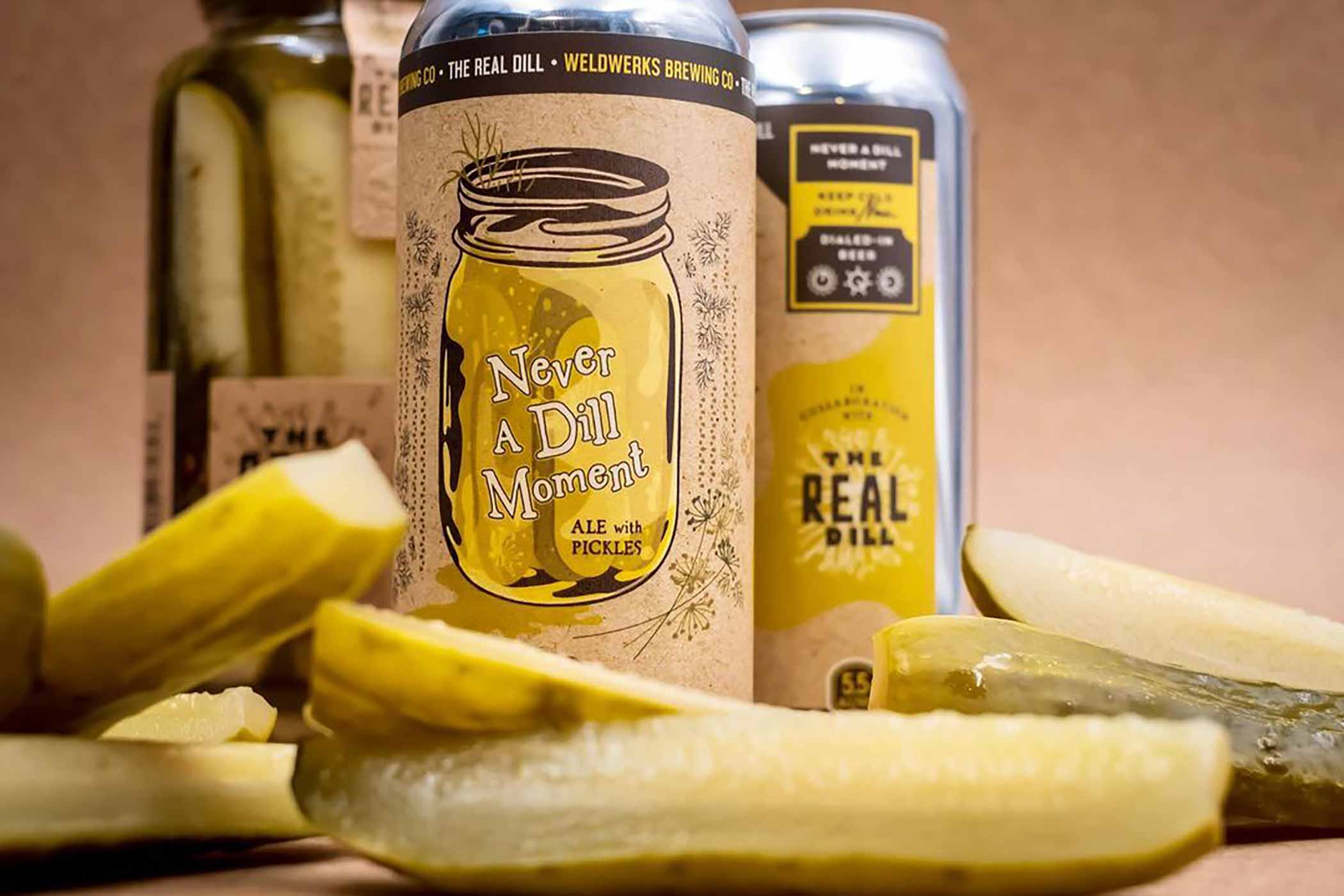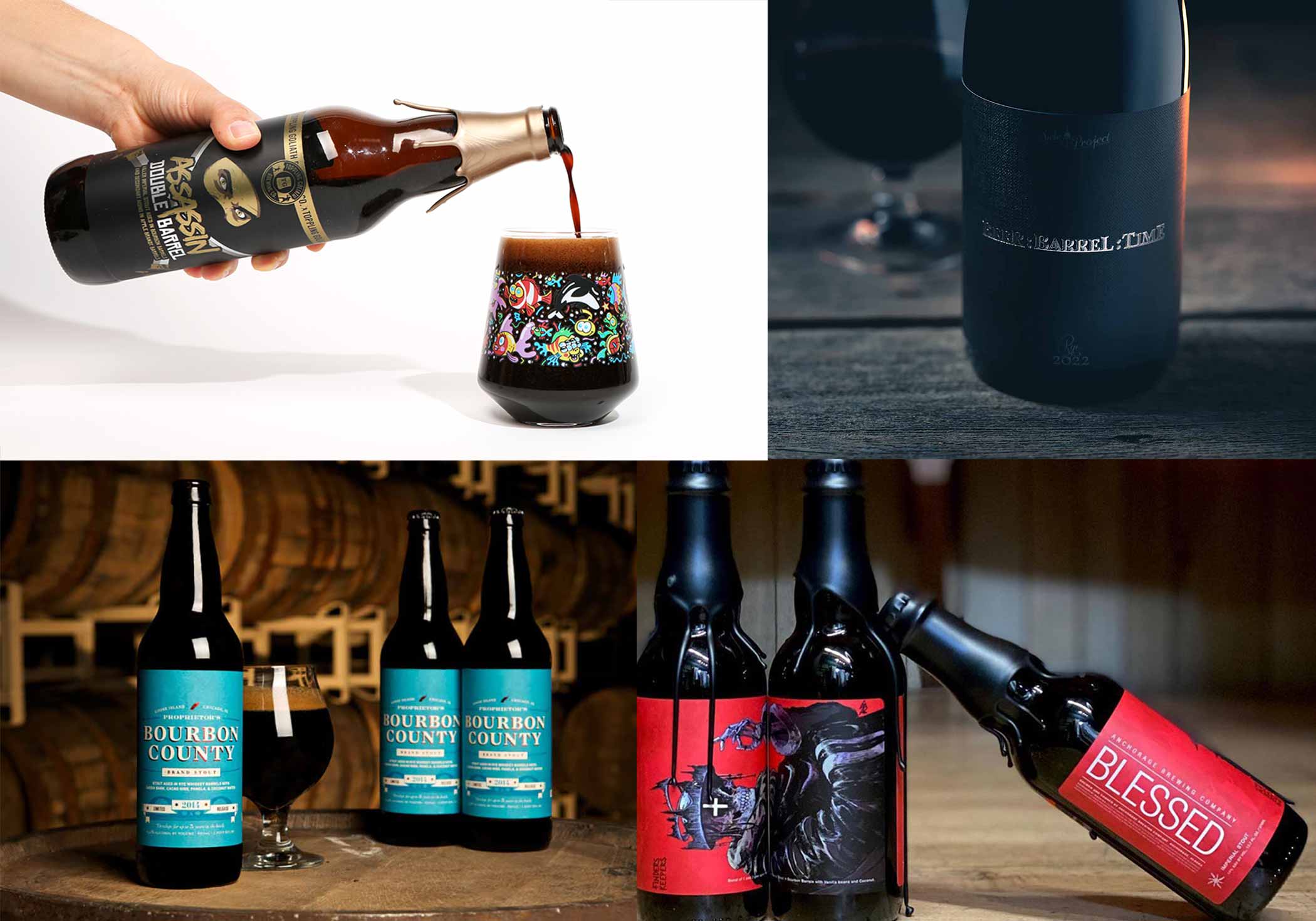Shop
A Pretty Big Dill: Hop Culture’s Pickle Beer Primer
In dill we trust.
Looking for More?
Sit down at the bar top at your favorite greasy spoon, and the first order of business is grabbing an easy-drinking lager or session IPA. Next? Pairing that with food.
Not much goes better with a beer in a dive than a juicy, messy, fatty burger laden with cheese, onions, ketchup, mustard, and, of course, pickles. A basket of fried pickles will do nicely if you’re not hungry enough to justify the instant demolition of your daily calorie count.
So there you are, savoring a crisp, cold, hoppy hug to your taste buds and eating pickles, whether on their own or served on a pickle delivery device. Sounds like a perfect afternoon. If eating pickles and drinking beer is an example of living one’s best life, though, what about cutting out the “eating” part? What about having your pickles and drinking them, too?
Like “nuclear medicine” or “oyster stout,” “pickle beer” are two words that, at a glance, do not belong together at all. Even a palate apostate who drinks pickle juice from empty jars of Claussen on purpose may hear the term and ever so slightly blanche. It is, to the ear, a strange concept, mixing pickles, or pickle ingredients, into beer, but the style has its adherents all the same despite the combination of flavor profiles—and despite a middling presence in the craft beer market.
In A Pickle? No, Pickle In A Beer
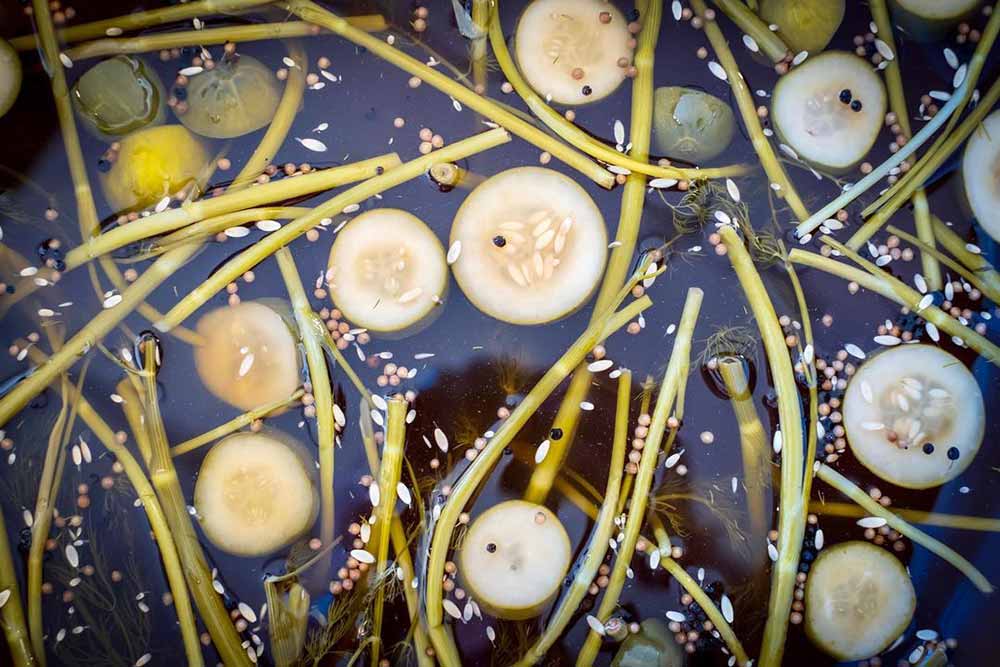
Photography courtesy of @weldwerksbrewing
As with most culinary beers, brewing pickle beer isn’t a one-way street; brewers have options.
“There’s a bunch of ways to do it,” says John Laughman, head brewer at Martin House Brewing Co. in Fort Worth, TX. “A lot of people will take cucumber, dill, and salt and try to recreate a pickle.”
This approach echoes the same approach many brewers opt for when making pumpkin beer: Adding flavors associated with pumpkin—cinnamon, nutmeg, brown sugar—into the beer rather than working with real pumpkin, which is notoriously laborious to prep for brewing.
Pickles, of course, are infinitely easier to brew with than pumpkin, and Martin House takes the opposite tack through an arrangement with Best Maid Pickles, a local family-owned business. “We just take our house sour base, get giant totes of pickle brine straight from Best Made, pump them into the brite tank, spin it up, and it’s ready to go,” Laughman explains.
Best Maid Pickles is just down the road from Martin House, making theirs a perfect arrangement. But none of this is to say that Martin House’s method is “better” than the cucumber-dill-salt method. It’s just different.
That is, unless sour beer is anathema to your senses, and you’d rather huff dirty gym socks than drink one. If that describes your preferences, a pickle beer like Martin House’s Best Maid Sour Pickle Beer probably won’t be your jam. But Laughman suggests chancing a taster anyway; he views their pickle beer the way a chef views a dish, in terms of balance.
“The saltiness really compliments the sour for sure,” he notes. “The brine isn’t very sour. It’s salty. So that actually rounds out the sourness of the beer.” Not coincidentally, the same can be said of the pickle’s effect on a burger. A bit of salty crunch can cut through the gooey textures in cheese or the unctuous character of a beef patty.
A Style Worth Ex-Spear-Imenting With
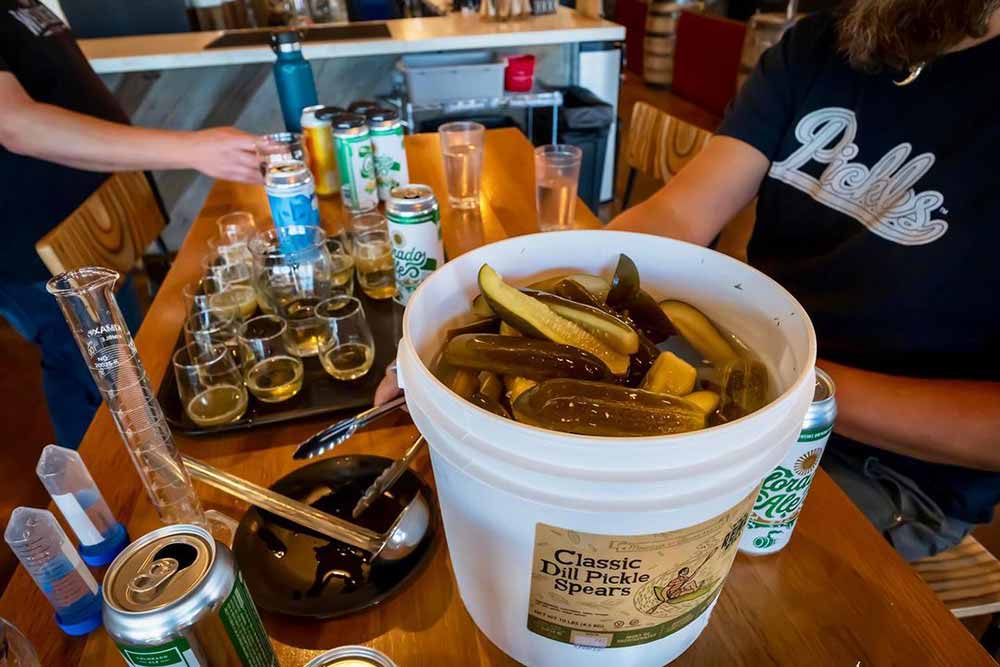
Photography courtesy of @weldwerksbrewing
Going through life drinking things you don’t want to isn’t much of a life at all, though, and if a sour pickle doesn’t strike your fancy, a sour pickle beer probably won’t, either. Fortunately, pickle beer is adaptable to different beer styles.
Eight hundred miles away from Martin House in Greeley, CO, the crew at WeldWerks Brewing Co. landed on a straightforward ale for their own pickle beer: Never a Dill Moment, a small batch collaboration between the brewery and Denver-based artisan pickle purveyors The Real Dill.
Skip Schwartz, WeldWerks’ head brewer, and his team aimed to brew a beer that “you could enjoy by the jar,” as he puts it, not missing the opportunity to toss in a good pun. “
Since we weren’t aiming to create a sour beer,” Schwartz continues, “we wanted to make sure it didn’t become too acidic and have the beer taste sour. We desired a beer with a pleasant pickle brine flavor, with just the right amount of salt and acidity, without being overly puckering or salty.”
Best Maid Sour Pickle Beer, being a sour beer, requires the extra step in the brewing process all sour beers do: Introducing bacteria plus an overnight rest so the brew can get funky. The sour side is a feature rather than a bug.
Never a Dill Moment leans into the salt component over the sour component, from which the challenge of balance arises.
“The first thing we were concerned with was ensuring the pH was balanced,” Schwartz says. That meant keeping the beer’s pH low because pickle brine’s pH is a skosh higher than beer’s. Missing that balance would mean failing the exercise WeldWerks set for themselves.
Now, Now; Don’t Get Too Salty
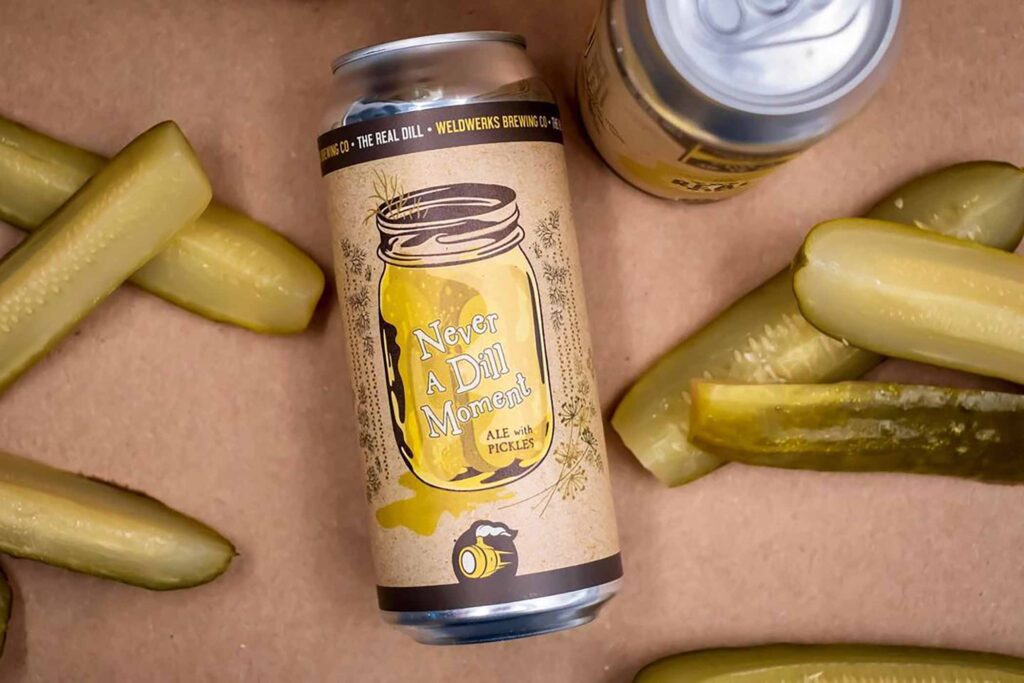
Photography courtesy of @weldwerksbrewing
Even after achieving that balance, there remain significant considerations for brewing pickle beer. WeldWerks and Martin House add their brine (and whole pickles in WeldWerks’ case) to the brite tank.
Brine, in scientific terms, is a potent protector of pickles; lactic acid bacteria grow during the pickling process, which gobbles up sugars in the cucumbers, denying potential bad bacteria a food source while keeping a tight leash on any spoilage microbes at the same time.
Pickle brine is excellent for your pickles’ preservation and good for flavoring beer, too. But there’s a catch. “Once [pickle brine] is mixed with beer, the salt-to-water ratio changes, which could pose a safety risk,” Schwartz says. “”
Sounds bad!
Happily, there’s an answer to the problem posed by the (brine) solution: Pasteurization. No harm, no foul, and the beer stays shelf-safe to boot. Now, all that’s left is to sell the stuff—but who’s buying?
Something’s Fickle About This Pickle
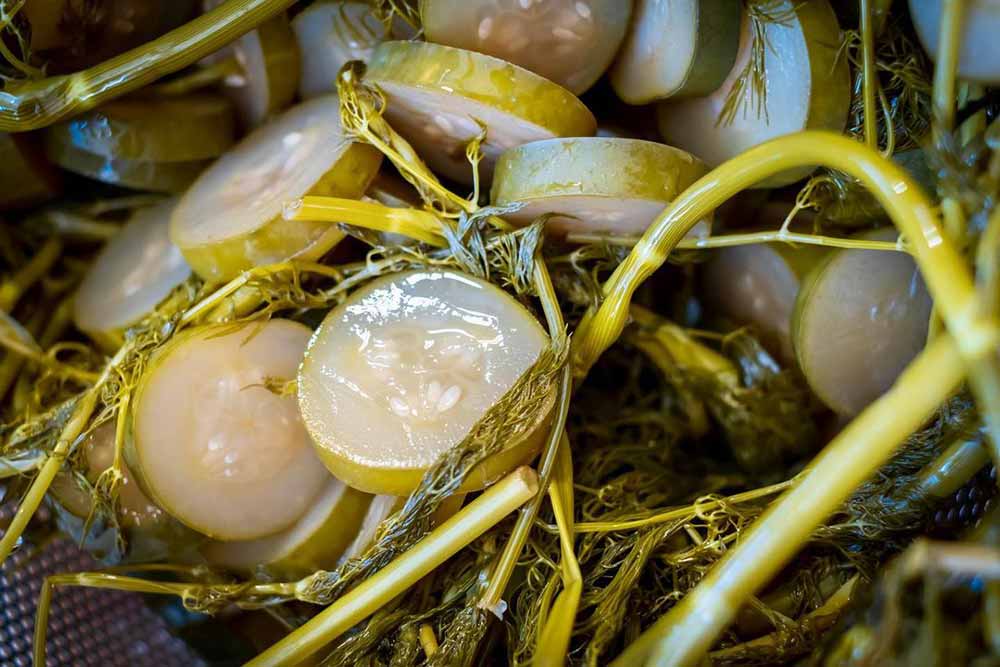
Marketing and selling pickle beer is a bit like balancing a seesaw: Lots of ups and downs. Pickle beer applies nicely to an assortment of ales sub-styles, but for the average craft beer drinker, it may as well be characterized as “extreme.”
What does and does not qualify as extreme is highly subjective. For connoisseurs of extreme, crazy beers accustomed to brewing additives ranging from garlic to hot dogs to Fatalii peppers, pickle brine is a meek ingredient. For the everyday crowd who favor straightforward beers, like pale ales, American lager, or a Berliner weisse, sampling a pickle beer is a bit much.
Breweries like Martin House are right at home in that space, where extreme beer is on the tap list but rounded out by options more familiar to a broader consumer base. “We’re known for doing crazy stuff,” Laughman says. “We definitely try to keep [our beers] in balance, but we are also making some of the most extreme beers probably on Earth.”
If unusual beer on a planetary scale perks your ears, great—you’re the person Martin House makes beers like Best Maid Sour Pickle Beer for in the first place. If not, that’s another story, but Laughman frames “extreme” as another way to appreciate beer. “When we’re making these crazier [brews], we want to transport people to a place and an experience,” Laughman points out, “instead of just saying, ‘Okay, here’s another IPA.’”
IPA is just another category. A product like pickle beer can suit numerous categories. It isn’t a style. It’s a flavor profile that can be married to any style you like if the profile is in harmony with the style. Thought of as such, pickle beer isn’t intimidating after all—just quirky compared to the standards. That’s an encouraging reason to take a sip if you haven’t already.
Broadly, however, consumers may actually be intrigued by the pickle beer concept. We are, it seems, in the year of the pickle. “Pickles are having a craze very similar to the bacon craze of the early 90s,” Schwartz says. “Not only are we seeing an increase in pickle beers, but they are crossing over into other markets.”
Schwartz isn’t wrong. Pickles are everywhere you wouldn’t expect them to be: Pickle ice cream, freeze pops, gumballs, candy canes, rice cakes. Heinz even has a pickle-flavored ketchup waiting in the wings to cure our post-holiday blues.
Most of these products sound foul in ways that pickle beer simply doesn’t; imagining how the experience of a pickle and the experience of a frozen dairy treat might marry well is a cursed thought experiment.
Still, if consumers will eat a waffle cone packed with scoops of milky, dill-spiked goodness, then why wouldn’t they try a pickle beer?
Embrace the trend, folks. Let this beloved piquant vinegary snack have fifteen minutes of fame, and relish every second of it.
Hop Culture’s Picks for the Best Pickle Beers to Try Right Now
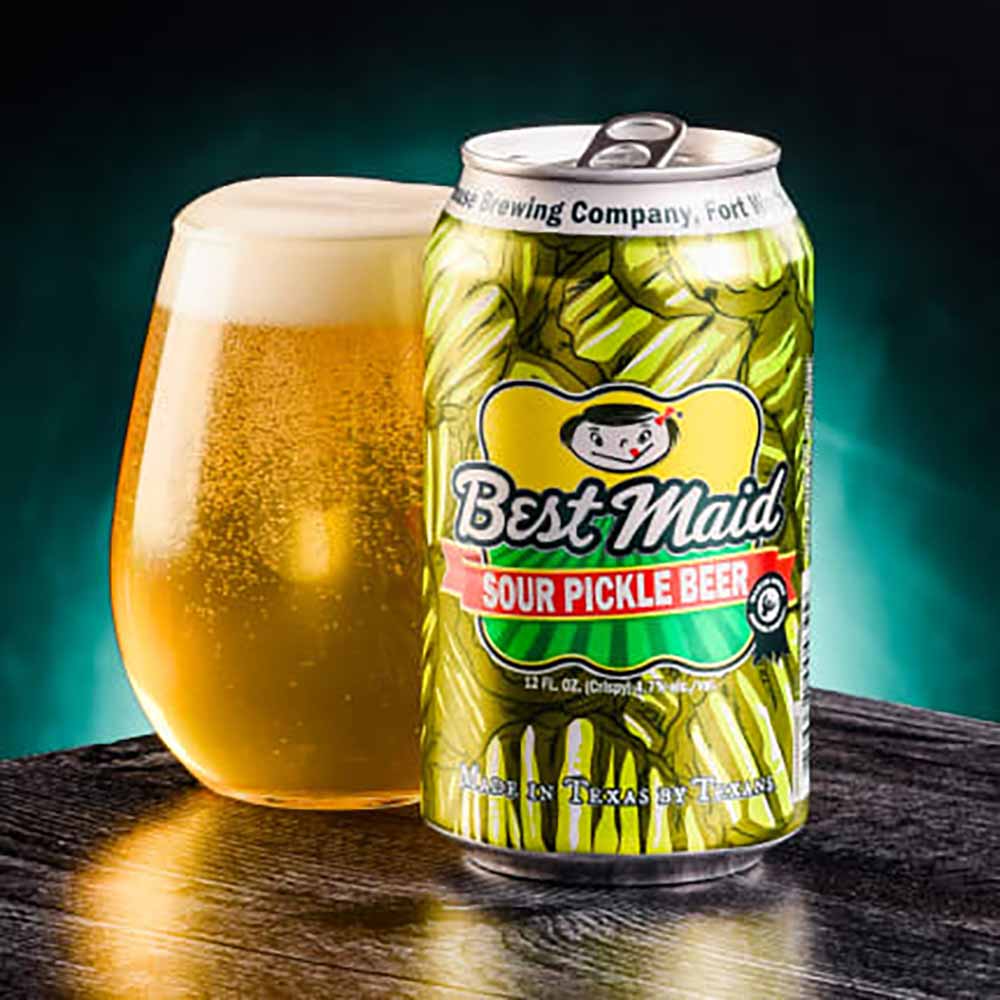
Photography courtesy of Tavour
Best Maid Sour Pickle Beer – Martin House Brewing Company
Fort Worth, TX
There’s something to be said about showing up at the party knowing exactly what kind of party it is; here, the party is a “pickle party,” and Martin House’s rendition of the sub-style really brings the pickle. The balance in Best Maid Sour Pickle Beer weighs in favor of the pickle side—catnip for the folks draining those Claussen jars. It’s easy to understand what Laughman means when he talks about experience. Best Maid Sour Pickle Beer packs enough nuances to avoid throwing the beverage out of whack, like light hints of caramel and white bread, but leans hardest on the “like drinking a whole pickle instead of eating it” angle—right down to the garlicky heat.
Pickle Juice – Four Quarters Brewing
Winooski, VT
As if to buttress the pickle beer’s style-agnosticism, Four Quarters’ Pickle Juice is a wild ale conditioned on the usual pickle suspects—fresh dill and cucumbers—with the added component of honeydew. Rather than an earthy frontal assault on the tongue, the beer opens with that sought-after pickle character before mellowing out into a bready, slightly sweeter space. The sour factor lingers but with a gentle sourness. By the time you finish a sip, you may forget you’re drinking pickle beer at all. It’s an alchemical experience.
PICKLE ME UP! – Bootstrap Brewing
Longmont, CO
From wild ale to golden, the pickle beer’s versatility just won’t stop. The major takeaway from Bootstrap’s variation on the style is that as simple as pickles are, they can express their scant handful of ingredients in different ways and to different degrees. PICKLE ME UP! puts dill at its forefront; that sweet, licorice-adjacent scent, that flowery softness on the palate, comes across with the most pronounced effect. In exchange, the beer deemphasizes the vinegary side of the brine, which is really only a problem for brine addicts. If that describes you, don’t worry—you’ll still enjoy PICKLE ME UP! for its warm aromatic character.
Pickle – Urban Artifact
Cincinnati, OH
Let’s get back to that cheeseburger from earlier because Urban Artifact’s pickle beer—simply called Pickle, apparently for the sake of just getting to the point—makes the strongest case for itself as a complement to beef patties and brioche buns. Pickle is endlessly complex; with every sip you take, you may find new notes, some expected (like dill, peppercorn, salt, and straw), some less so (like lemon, wheat, white grape), but all of them well-suited for pairing with the right plate of food. In a way, that makes Pickle less attractive as a standalone option compared to its peers, but of course, this isn’t a criticism—far from it. Rather, it’s astonishing how well-crafted Pickle is as a mealtime beer, something that drinks well on its own but really shows off its complexity when combined with dinner.
Pickle (Farmstand Ale) – Plan Bee Farm Brewery
Poughkeepsie, NY
From the reaches of New York (because Poughkeepsie, to the average New Yorker, is basically a hinterland, and anything beyond that defies imagination), here’s Plan Bee Farm’s Pickle, yet again proving that sometimes truth in advertising is the best naming convention. (Note: Just Pickle. Not Farmstead Ale Pickle or Pickleback. Just. Pickle.) Plan Bee is unique from the beers listed here in that while it’s fundamentally about the pickles, the stages of tasting feel a bit like the stages of bringing. Cucumber is at the beer’s forefront, refreshing and juicy, with its vitality intact prior to the emergence of supporting brine character. Maybe there’s a lesson here: That pickle beer is broadly subjective compared to other styles. Folks looking for a pickle-forward drink might be disappointed because Pickle isn’t quite that. It’s transformational. But folks in the market for something completely different from most of the other pickle beers out there may find themselves enchanted.

